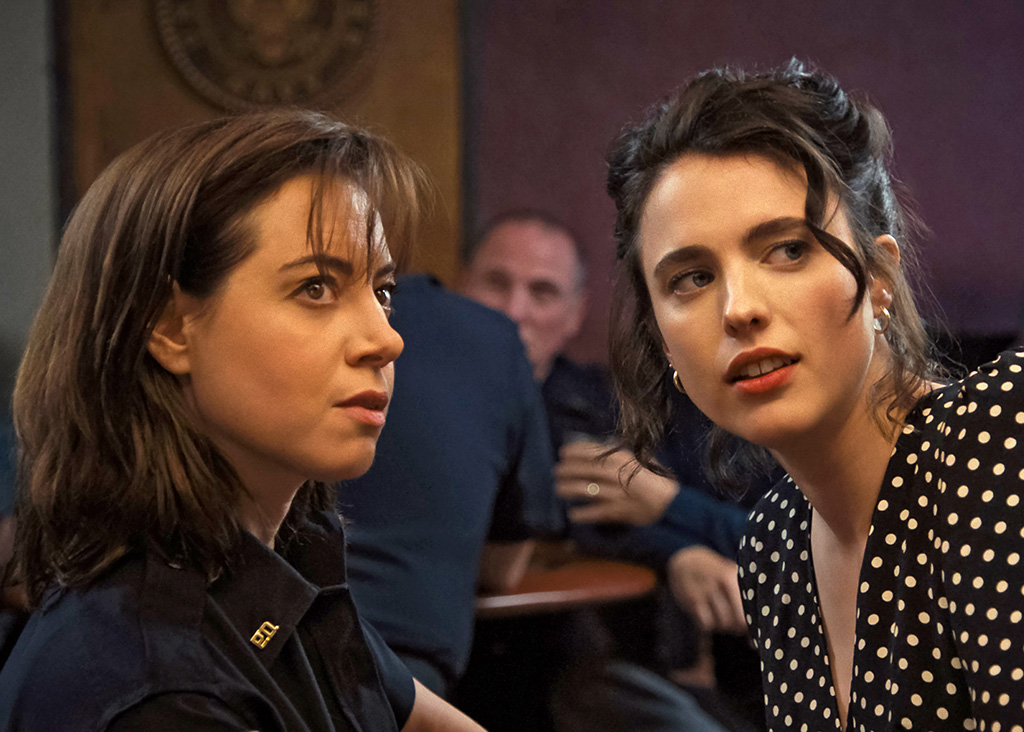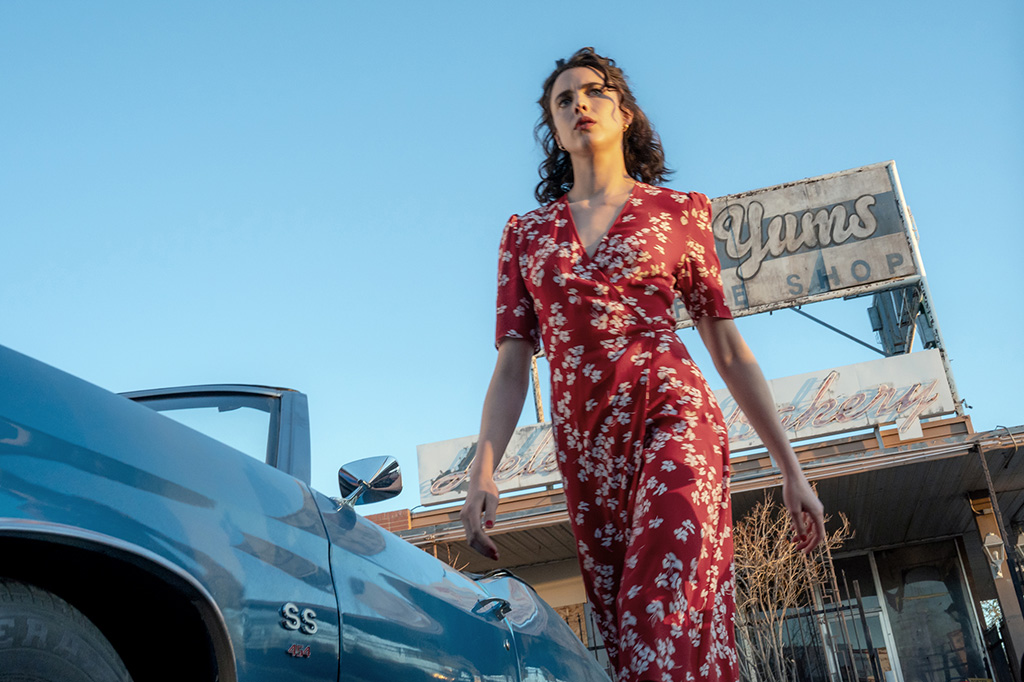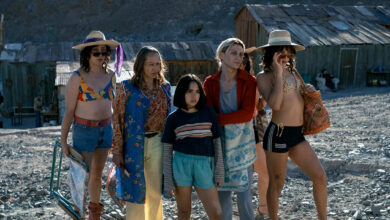Lesbian Noir Honey, Don’t! Offers Unfiltered But Fleeting Fun
Margaret Qualley and Aubrey Plaza lead the latest Coen ensemble comedy.

Honey, Don’t! marks the second collaboration between wife/husband duo Tricia Cooke and Ethan Coen (half of the Coen Brothers), writing and directing lesbian dark comedies involving organized crime, dildos, and Margaret Qualley. The latter stars as Honey O’Donahue, a femme lesbian private detective in a small California town whose cases usually involve local scandals such as cheating allegations. When a car crash involving one of her clients begins to look less like an accident, Honey begins to (loosely) investigate the potential homicide, specifically focusing her attention on the prolific local church, Four Points.
Loosely is an important qualifier as this is a film by the same director as O Brother, Where Art Thou? and Burn After Reading. There’s an ensemble cast, including an everyday cop in the homicide unit, Marty Metakawitch (Charlie Day), a kinky cultish church leader, Reverend Drew Devlin (Chris Evans), and a clerical cop love interest, MG Falcone (Aubrey Plaza), among many others. The mystery unfolds around Honey rather than through her, with the ties between the dead girl, the church, the local Weiner House, and “the French” all coming together through a series of encounters that the titular character is only occasionally privy to. Similarly, the story is merely a framing device; Honey, Don’t! is more often a screwball comedy masquerading as a detective noir.
Ethan Coen and Tricia Cooke position Honey, both the character and the film, as a clear gender/genre bend of this detective archetype. Honey herself is a hard-drinking womanizer playing by her own code of conduct, complete with an elusive love interest and a young girl in need of saving. Within the first 10 minutes, the film introduces Mr. Siegfried (Billy Eichner) as a paranoid damsel-in-distress, sans the classic platinum blonde hair, asking Honey to find out if his husband is cheating on him.
The story beats are almost too on-the nose, to the point that the first 15 minutes almost mirror The Naked Gun. There’s a provocative tameness to these tropes though: Siegfried is not the femme fatale, Honey’s drinking is never an addiction, and her consistent one-night stands stem more from loneliness than any sense of misogyny. There’s an acute subterfuge of key noir facets that not only give a contemporary update to the genre, but reckon with what a feminist detective story can be.

There’s a playfulness here that’s also found in the director/writer duo’s last film, Drive Away Dolls, merging the Coen’s frenetic but mostly controlled humor with a sense of oddball queerness that the duo attributes to Cooke. The two have opened up about their non-traditional marriage, which allows Tricia to have a lesbian partner, and with it comes new creative avenues. Alongside the aforementioned sex toys, there’s a deluge of unbridled queerness that feels increasingly rare in mid-sized studio-released films. The lesbian pulp aesthetic never utilizes its raunchiness or gay sex for cheap laughs either. It’s quite remarkable that queer audiences feel prioritized, without concern whether straight audiences will freak out over Aubrey Plaza’s MG Falcone fingering Honey at a bar and licking her fingers after.
While these two styles create an interesting mix, there’s still a sense of tension created as one ponders what the film itself is trying to be. The pastiche of the film never quite comes together, making reference to ’70s noir detective films such as Robert Altman’s The Long Goodbye without actually fully committing to its realization, leading to sometimes confusing editing and filmmaking choices. It borders between subversion and commentary on the genre but can’t quite pull either off, lacking a sense of sincerity to fully offer the latter while not biting hard enough to be the former.
Everyone is doing an accent but it’s not necessarily all with the same level of intention or geographical location. And as with the most run-of-the-mill Coen Brothers movies, the parts are often greater than the whole, investing too much in the uniqueness of each character and not how they interact with one another. It lacks a sense of sharpness to the dialogdialogue and overall structure, with just as many jokes that fall flat as there are quips that elicit a good chuckle. Red herrings are abundant, never calculating enough to create the sense of tension necessary to fulfill a true 90-minute noir, leading to a feeling that the film lacks the attunement to create a successful gumshoe story.
The movie works best when its queer thematics are imbued into a more classic Coen sensibility, utilizing wit to provide incisive commentary on both media tropes and societal norms. For example, the Reverend preaches that everyone must be fully submissive to God, played to high camp with reference to a Joel Osteen-esque mega-preacher that fits perfectly well in the ’70s as well in a contemporary context. Similarly, Marty continues to ask Honey out on a date, with her only response being “how many times do I have to tell you, I like women,” to which he always laughs.
It’s able to operate on multiple levels, allowing all audiences to laugh while mirroring salient realities for queer and femme people. Its paperback grit is both its strength and weakness, offering a deliciously entertaining queering of both detective narratives and expectations, though occasionally cheapening itself with uneven writing to meet the mold.
While the film often feels disjointed, it’s sutured together with goodwill and earnest attempts at not equating “queer genre film” with direct-to-streaming horror movies. There should be gay revenge thrillers, trans scream queens, and lesbian pulp detective noirs, even if they don’t always hit every note. And who could complain about Aubrey Plaza as a DIY butch lesbian cop?
Honey, Don’t! is now playing in theaters.










